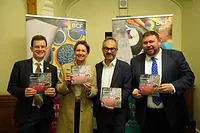BIC Launches Report to Help Bio-Economy Projects Access Finance
BRUSSELS – The Bio-based Industries Consortium (BIC) has released a new overview of financial instruments available to support European bio-economy development.
The overview, Access to EU Financial Instruments Suitable for the Implementation of Large Bio-based Industry Investments, outlines a range of funding opportunities and explores the synergies between different instruments for co-financing biobased projects.
Since BIC’s 2014 report, Combining BBI (H2020) and European Structural and Investment Funds (ESIF), the funding landscape for biobased projects has evolved. The European Commission launched the Juncker Plan in 2015 and the European Investment Bank (EIB) published a Study on Access to Finance in June 2017, which was compiled in close collaboration with BIC and its members and discusses the barriers and opportunities for bio-economy investments. The EIB and the European Commission have recently pledged a stronger commitment to the European circular economy and bio-economy sectors through a set of actions aimed to facilitate access to finance.
BIC’s latest report factors in these new changes and raises awareness of the EU instruments available today for supporting biobased ventures, especially for demonstration and flagship investments. EU financial instruments discussed include BBI JU/Horizon 2020 grants, EIB/InnovFin, the European Fund for Structural Investments (EFSI), European Structural and the Investment Funds (ESIF) and the recently announced Circular Bio-economy Thematic Investment Platform (TIP). The report also includes information on other sources of funding such as the European Bank for Reconstruction and Development (EBRD).
Dirk Carrez, Executive Director of the Bio-based Industries Consortium, said, "Bio-economy investments are crucial to reduce Europe’s dependence on non-renewable resources and to make our economy more sustainable. BIC’s report is a practical guide for anyone looking to invest in the bio-economy, providing a breakdown of applicable instruments and co-funding opportunities, ranging from debt and equity to quasi-equity financing and grants. BIC continues to provide its members with vital information on how to access capital and mobilize investment in biobased developments.”
Looking for a reprint of this article?
From high-res PDFs to custom plaques, order your copy today!





